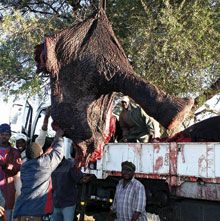The day men almost bit their dogs
| Friday June 13, 2008 00:00


GWETA: The meaning of the adage 'One man's meat is another man's poison' has been unravelled to Mmegi. The scene is the kgotla here on a Wednesday morning earlier this year.
Volunteers of the Botswana Red Cross Society (BRCS are at the village kgotla distributing humanitarian aid to victims of floods.
But as a group of senior citizens waits patiently inside a tent, many more people walk by in a different direction.
Under a motswere tree a stone's throw away from the kgotla sits a J5 truck belonging to the Department of Wildlife commanding the attention of the greater majority of the villagers and their dogs.
The cargo of the truck is none other than the carcass of the largest animal on terra firma - an elephant. Although a pack of dogs hangs on the fringes drooling at the mouth, it is clear from the bearing of the crowd - mostly men - that 'man's best friend' is an unwanted guest here, at least today. Infact the situation is almost taken straight from a reporter's elementary lesson that it is not a story when a dog bites a man, but it is a scoop when a man bites a dog.
The poor canines, carnivores by nature, are being treated with savage force at every turn they try to snatch even a stray piece of the elephant - an animal of ample proportions, as their masters well know.
'Keep the dogs away,' hollers a burly woman pushing a wheelbarrow.
The squealing noise of more wheelbarrows and donkey carts is competing with a public address system mounted on a red Uno calling on people to come to a rally of the Botswana Democratic Party (BDP).
Under normal circumstances, such an appeal would be met with cries of 'Tsholetsa!' But not today; the people rally instead around the dead elephant, which commands their attention, and the dogs, which spawn their antagonism.
Those without wheelbarrows or donkey carts are lugging sacks laden with meat. At the Thebekgwama Shopping Complex nearby, a shop assistant is heard tell colleagues that the times of plenty are back, this being the fourth elephant killed and brought here in less than a month.
A young man emerges from the shops, an Okapi hand knife in one hand, a brick on the other.
'Everyone's teeth will get to work at supper tonight,' he says in anticipation of the delectable repast ahead.
Outside the truck, two women argue with two wildlife officers, protesting that they are cutting huge chunks of meat for able-bodied men. 'Women will always complain,' one such able-bodied young fellow in dreadlocks says as he manoeuvres his laden wheelbarrow out of the 'madding crowd' which will have no truck with the press.
'You want to tell the whole world that we eat elephant meat? No thanks,' says a man busy sharpening his carving knife, as if eating elephant meat was 'wrong'. And then, his mouth over a pint of Shake-Shake, another man says it for him: 'It's your problem if you think it is wrong for us to eat elephant meat.'
Yet another joins in to enlighten us: 'The meat is more delicious than ox beef, if you don't know,' he says, almost jeering.
'Infact, it is cooked just like all other meat,' a voice from the truck joins in the rhapsody. Looking up, I see that its source is helping to offload what must be the world's biggest liver; it is the size of grown goat.
Strangely, the wildlife officers are not in the mood to tell us where and why the elephant was killed.
Only an aggrieved Bokowe Charlie is willing to talk to the press. But Charlie is here only as a spectator: 'I venerate the Elephant,' he intones, at once sorrowed and proud.
'The Elephant is my totem. I do not eat of it.
He says this is the fourth dead Elephant - with capital 'E' - he has seen brought to the Motswere tree in less than a month.
'I suspect the Elephant is the victim of an official culling programme.'
But it is unlikely it was only poor Charlie who went without the scrumptious dinner that evening. The poor dogs, subspecies of the exclusively carnivorous wolf, also without.
